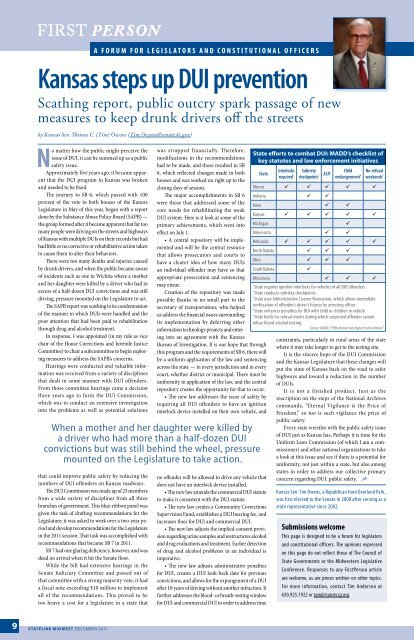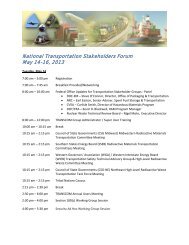Stateline Midwest - CSG Midwest
Stateline Midwest - CSG Midwest
Stateline Midwest - CSG Midwest
You also want an ePaper? Increase the reach of your titles
YUMPU automatically turns print PDFs into web optimized ePapers that Google loves.
FIRST PERSON<br />
A forum for legislators and constitutional officers<br />
Kansas steps up DUI prevention<br />
Scathing report, public outcry spark passage of new<br />
measures to keep drunk drivers off the streets<br />
by Kansas Sen. Thomas C. (Tim) Owens (Tim.Owens@senate.ks.gov)<br />
No matter how the public might perceive the<br />
issue of DUI, it can be summed up as a public<br />
safety issue.<br />
Approximately five years ago, it became apparent<br />
that the DUI program in Kansas was broken<br />
and needed to be fixed.<br />
The journey to SB 6, which passed with 100<br />
percent of the vote in both houses of the Kansas<br />
Legislature in May of this year, began with a report<br />
done by the Substance Abuse Policy Board (SAPB) —<br />
the group formed after it became apparent that far too<br />
many people were driving on the streets and highways<br />
of Kansas with multiple DUIs on their records but had<br />
had little or no corrective or rehabilitative action taken<br />
to cause them to alter their behaviors.<br />
There were too many deaths and injuries caused<br />
by drunk drivers, and when the public became aware<br />
of incidents such as one in Wichita where a mother<br />
and her daughter were killed by a driver who had in<br />
excess of a half-dozen DUI convictions and was still<br />
driving, pressure mounted on the Legislature to act.<br />
The SAPB report was scathing in its condemnation<br />
of the manner in which DUIs were handled and the<br />
poor attention that had been paid to rehabilitation<br />
through drug and alcohol treatment.<br />
In response, I was appointed (in my role as vice<br />
chair of the House Corrections and Juvenile Justice<br />
Committee) to chair a subcommittee to begin exploring<br />
measures to address the SAPB’s concerns.<br />
Hearings were conducted and valuable information<br />
was received from a variety of disciplines<br />
that dealt in some manner with DUI offenders.<br />
From those committee hearings came a decision<br />
three years ago to form the DUI Commission,<br />
which was to conduct an extensive investigation<br />
into the problems as well as potential solutions<br />
When a mother and her daughter were killed by<br />
a driver who had more than a half-dozen DUI<br />
convictions but was still behind the wheel, pressure<br />
mounted on the Legislature to take action.<br />
that could improve public safety by reducing the<br />
numbers of DUI offenders on Kansas roadways.<br />
The DUI Commission was made up of 23 members<br />
from a wide variety of disciplines from all three<br />
branches of government. This blue-ribbon panel was<br />
given the task of drafting recommendations for the<br />
Legislature; it was asked to work over a two-year period<br />
and develop recommendations for the Legislature<br />
in the 2011 session. That task was accomplished with<br />
recommendations that became SB 7 in 2011.<br />
SB 7 had one glaring deficiency, however, and was<br />
dead on arrival when it hit the Senate floor.<br />
While the bill had extensive hearings in the<br />
Senate Judiciary Committee and passed out of<br />
that committee with a strong majority vote, it had<br />
a fiscal note exceeding $10 million to implement<br />
all of the recommendations. This proved to be<br />
too heavy a cost for a legislature in a state that<br />
was strapped financially. Therefore,<br />
State efforts to combat DUI: MADD’s checklist of<br />
modifications in the recommendations<br />
key statutes and law enforcement initiatives<br />
had to be made, and those resulted in SB<br />
6, which reflected changes made in both<br />
Interlocks Sobriety<br />
Child No-refusal<br />
State<br />
ALR<br />
required<br />
houses and was worked on right up to the<br />
checkpoints 3 2 endangerment 4 weekends 5<br />
closing days of session.<br />
The major accomplishments in SB 6<br />
Illinois<br />
Indiana<br />
<br />
<br />
<br />
<br />
<br />
were those that addressed some of the<br />
Iowa <br />
core needs for rehabilitating the weak<br />
Kansas <br />
DUI system. Here is it look at some of the<br />
primary achievements, which went into<br />
effect on July 1.<br />
• A central repository will be implemented<br />
Michigan<br />
Minnesota<br />
Nebraska <br />
<br />
<br />
<br />
<br />
<br />
and will be the central resource<br />
North Dakota <br />
that allows prosecutors and courts to<br />
Ohio<br />
have a clearer idea of how many DUIs<br />
<br />
an individual offender may have so that South Dakota<br />
<br />
appropriate prosecution and sentencing Wisconsin <br />
may ensue.<br />
1<br />
State requires ignition interlocks for vehicles of all DUI offenders.<br />
2<br />
Creation of the repository was made State conducts sobriety checkpoints.<br />
possible thanks in no small part to the<br />
3<br />
State uses Administrative License Revocation, which allows immediate<br />
secretary of transportation, who helped<br />
confiscation of offender’s driver’s license by arresting officer.<br />
4<br />
State enhances penalties for DUI with child or children in vehicle.<br />
us address the financial issues surrounding 5<br />
State holds no-refusal events during which suspected offender cannot<br />
its implementation by deferring other refuse blood-alcohol testing.<br />
information technology projects and entering<br />
Source: MADD, “Fifth Anniversary Report to the Nation”<br />
into an agreement with the Kansas<br />
Bureau of Investigation. It is our hope that through<br />
this program and the requirements of SB 6, there will<br />
be a uniform application of the law and sentencing<br />
across the state — in every jurisdiction and in every<br />
court, whether district or municipal. There must be<br />
uniformity in application of the law, and the central<br />
repository creates the opportunity for that to occur.<br />
• The new law addresses the issue of safety by<br />
requiring all DUI offenders to have an ignition<br />
interlock device installed on their own vehicle, and<br />
no offender will be allowed to drive any vehicle that<br />
does not have an interlock devise installed.<br />
• The new law amends the commercial DUI statute<br />
to make it consistent with the DUI statute.<br />
• The new law creates a Community Corrections<br />
Supervision Fund, establishes a DUI hearing fee, and<br />
increases fines for DUI and commercial DUI.<br />
• The new law adjusts the implied-consent provision<br />
regarding urine samples and restructures alcohol<br />
and drug evaluations and treatment. Earlier detection<br />
of drug and alcohol problems in an individual is<br />
imperative.<br />
• The new law adjusts administrative penalties<br />
for DUI, creates a DUI look-back date for previous<br />
convictions, and allows for the expungement of a DUI<br />
after 10 years of driving without another infraction. It<br />
further addresses the blood- or breath-testing window<br />
for DUI and commercial DUI in order to address time<br />
constraints, particularly in rural areas of the state<br />
where it may take longer to get to the testing site.<br />
It is the sincere hope of the DUI Commission<br />
and the Kansas Legislature that these changes will<br />
put the state of Kansas back on the road to safer<br />
highways and toward a reduction in the number<br />
of DUIs.<br />
It is not a finished product. Just as the<br />
inscription on the steps of the National Archives<br />
commands, “Eternal Vigilance is the Price of<br />
Freedom,” so too is such vigilance the price of<br />
public safety.<br />
Every state wrestles with the public safety issue<br />
of DUI just as Kansas has. Perhaps it is time for the<br />
Uniform Laws Commission (of which I am a commissioner)<br />
and other national organizations to take<br />
a look at this issue and see if there is a potential for<br />
uniformity, not just within a state, but also among<br />
states in order to address our collective primary<br />
concern regarding DUI: public safety.<br />
Kansas Sen. Tim Owens, a Republican from Overland Park,<br />
was first elected to the Senate in 2008 after serving as a<br />
state representative since 2002.<br />
Submissions welcome<br />
This page is designed to be a forum for legislators<br />
and constitutional officers. The opinions expressed<br />
on this page do not reflect those of The Council of<br />
State Governments or the <strong>Midwest</strong>ern Legislative<br />
Conference. Responses to any FirstPerson article<br />
are welcome, as are pieces written on other topics.<br />
For more information, contact Tim Anderson at<br />
630.925.1922 or tanderson@csg.org.<br />
9 STATELINE MIDWEST December 2011








